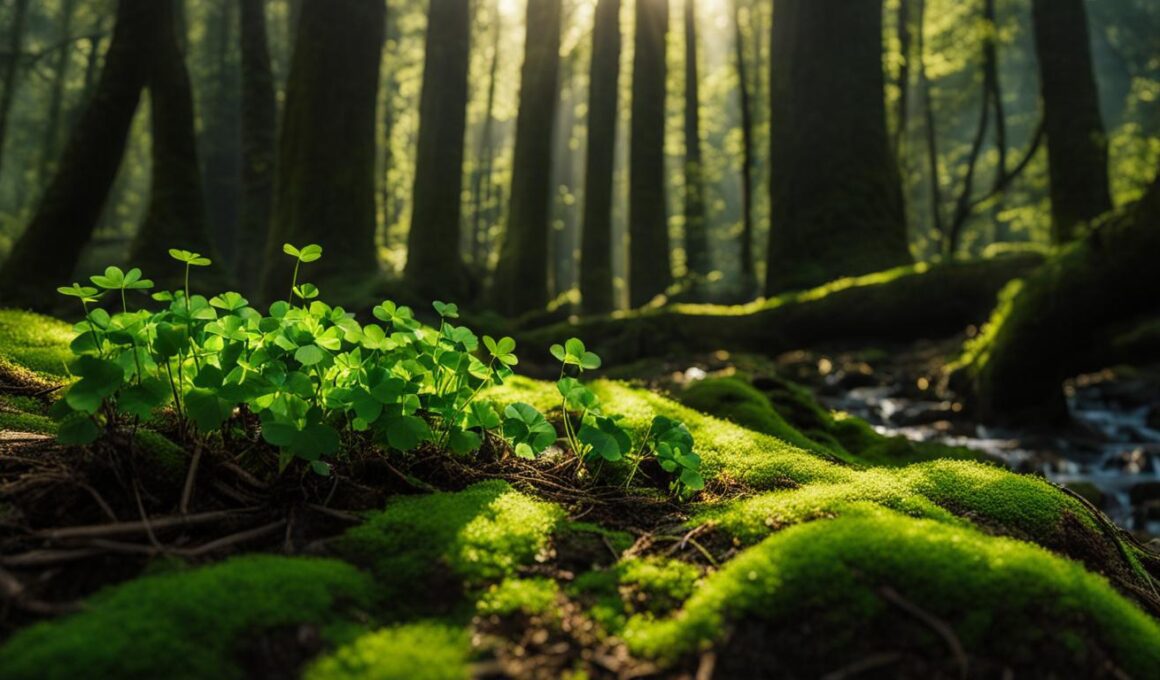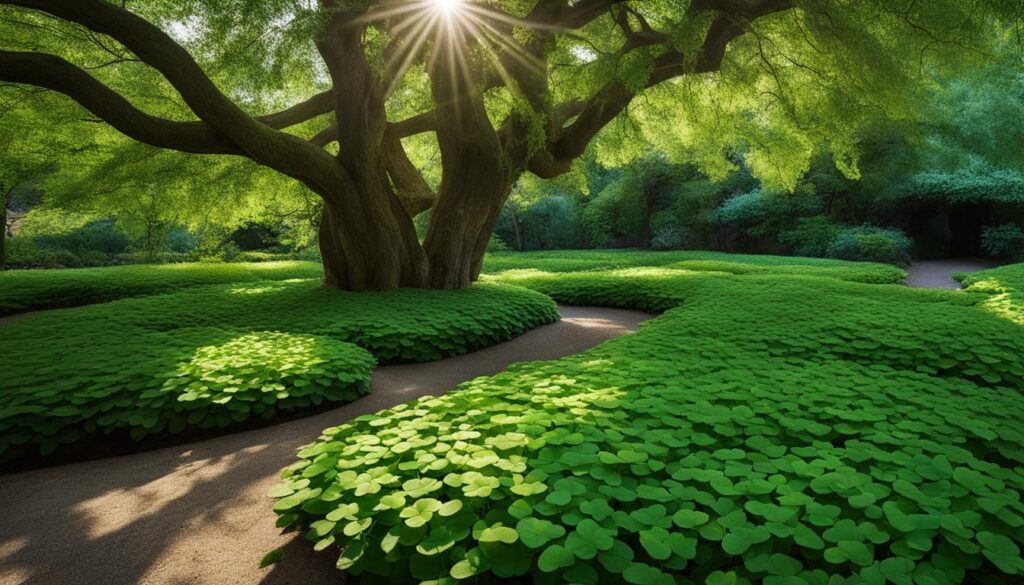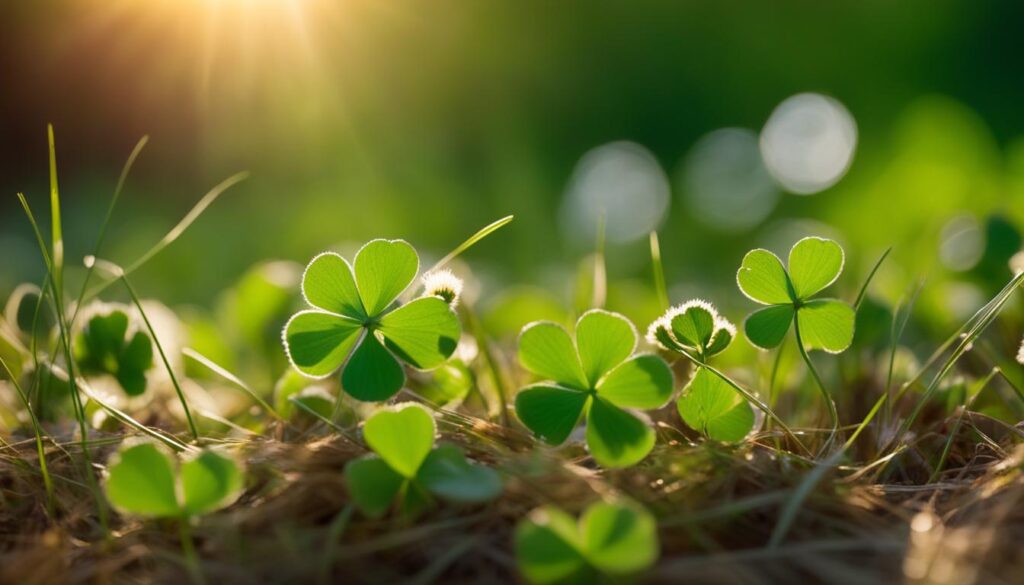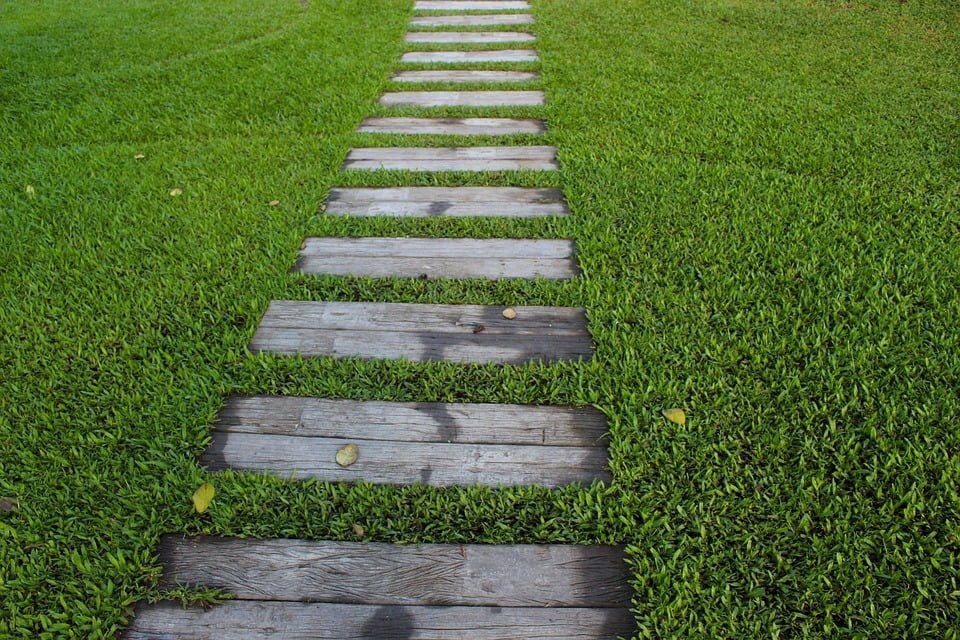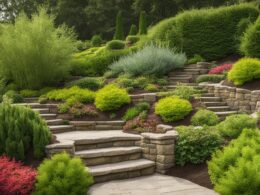Clover is a versatile ground cover that can thrive in shaded areas of your garden. It has several benefits, including its ability to fix nitrogen for other plants and its low-maintenance nature. While clover is generally more shade-tolerant than grass, it does have some limitations in heavily shaded areas. However, there are certain varieties of clover that are better suited for shade, such as white clover, red clover, and microclover. Mixing clover with traditional grass or other clover species is also recommended for an even, green lawn in shaded areas.
Key Takeaways:
- Clover can grow in shaded areas and offers several benefits, such as nitrogen fixation and low-maintenance.
- Some varieties of clover, like white clover, red clover, and microclover, are more shade-tolerant.
- Mixing clover with grass or other clover species can help create an even, green lawn in shaded areas.
- Clover requires less water, less frequent mowing, and less fertilizer compared to traditional turfgrasses.
- Consider the specific conditions of your lawn to choose the right clover varieties for optimal growth in shade.
Benefits of Growing Clover in Shade
Growing clover in shaded areas offers several advantages.
- Reduced Watering Needs: Clover requires less water than grass, making it more water-efficient.
- Low Maintenance: Compared to turfgrasses, clover needs less frequent mowing, saving you time and effort on lawn maintenance.
- Heat-Tolerant: Clover maintains its green color even during the summer, making it more tolerant to heat compared to grass.
- Environmentally Friendly: Clover doesn’t require frequent fertilizer applications, herbicides, or pesticides, reducing environmental impact and promoting a healthier lawn.
- Attracts Beneficial Insects and Pollinators: Clover creates an ecologically-rich environment by attracting beneficial insects and pollinators to your lawn.
By growing clover in shaded areas, you can reap these benefits while creating a lush and environmentally-friendly outdoor space.
Best Types of Clover for Shade
When it comes to growing clover in shaded areas, certain varieties are more suitable. White clover is the most well-known and widely grown clover in the United States. It is a low-growing, rapid spreader that outcompetes weeds and thrives in poor soil. Red clover, with its pretty reddish-purple flowers, is taller than white clover and can tolerate shade to some extent. Microclover, a newer cultivar of white clover, has smaller leaves and fewer flowers, making it blend well with other grasses in shaded areas.
These varieties of clover offer resilience and adaptability, making them the best choices for shady spots in your garden. Whether you prefer the versatility of white clover, the beauty of red clover, or the uniformity of microclover, there’s a shade-tolerant clover variety to suit your needs.
Growing Clover in Partial Shade
Clover can tolerate a variety of light levels, including partial shade with two to six hours of direct sunlight per day. It is generally more shade-tolerant than grass but may not thrive in heavily shaded areas. For areas with dense shade, it is recommended to choose more shade-resistant perennials like hostas or ferns.
However, in areas with partial shade, clover can still grow well and provide a lush ground cover. It is important to ensure proper soil conditions and regular watering to support clover growth in partial shade.
Clover is a versatile and hardy ground cover that can thrive in various conditions. It is well-suited for partial shade, making it ideal for areas with limited sunlight. The image above showcases the beauty of clover in partial shade, with its vibrant green leaves and delicate white flowers.
Considerations for Growing Clover in Shade
Clover is a resilient and adaptable ground cover that can thrive in shaded areas of your lawn or garden. While it is more shade-tolerant than grass, there are a few considerations to keep in mind when growing clover in shade.
Turf Traffic
Although clover can tolerate shade, it may not be as resilient as traditional turfgrasses in heavily trafficked areas. If your lawn experiences high foot traffic, consider mixing clover with turfgrass to ensure durability and resilience. This combination can create a lush and vibrant lawn that can withstand the wear and tear of daily use.
Densely Shaded Lawns
In densely shaded areas where sunlight is limited, clover may not thrive as well as other shade-resistant perennials. If your lawn has areas with dense shade, it might be more suitable to explore shade-tolerant perennials such as hostas or ferns. These plants can create a beautiful and low-maintenance ground cover in areas that receive minimal sunlight.
Climatic Considerations
When considering clover for shade, it’s essential to take into account your region’s climate. Clover prefers cool weather and moderately moist conditions, making it best suited for regions with mild, temperate climates. Cold and arid regions may not provide the ideal growing conditions for clover. In such cases, it might be worth exploring other alternatives that thrive in your specific climate.
Bee Sting Allergies
It’s important to note that clover attracts bees with its sweet nectar and vibrant flowers. If you have bee sting allergies or concerns about bee activity, exercise caution when choosing clover for your lawn. Alternatively, you can focus on selecting varieties of shade-tolerant ground covers that are less attractive to bees, ensuring a worry-free outdoor experience.
Consider all these factors when deciding whether to grow clover in shaded areas of your lawn or garden. By understanding the considerations unique to your situation, you can make an informed choice that aligns with your preferences and creates a beautiful, low-maintenance outdoor space.
Planting and Germination of Clover
When it comes to planting and germinating clover, there are a few key steps to follow to ensure success. Clover can be planted in either spring or late summer, depending on your specific growing conditions. To establish new clover seeds, it is important to mist them daily and provide sufficient watering as needed. This helps to create a moist environment that encourages germination.
Clover typically germinates within a week, although the exact time may vary based on planting conditions such as temperature and moisture levels. To take advantage of freeze-thaw cycles, you can also consider frost-seeding in early spring or late winter.
Proper soil preparation is crucial for the successful germination and establishment of clover. Make sure to clear the area of any weeds or debris and loosen the soil to ensure good seed-to-soil contact. Following the planting instructions on the seed package is also important for optimal results.
Shade-Tolerant Perennial Clover Seeds
When it comes to growing clover in shaded areas, shade-tolerant perennial clover seeds are the way to go. One excellent option is the Wild Game Buffet seed blend, specifically designed for shaded woods and areas with less sunlight. This blend combines different clover varieties, alfalfa, and brassicas, making it suitable for various growing conditions and soil types.
With shade-tolerant perennial clover seeds, you can create a thriving green cover even in shaded woods or openings. These seeds are best planted in spring or late summer and can be sown with minimal or no tilling of the soil, providing a hassle-free planting process. The recommended seeding rate for the Wild Game Buffet blend is 8-10 lbs per acre, ensuring optimal coverage for your shaded areas.
To highlight the effectiveness of shade-tolerant perennial clover seeds, take a closer look at the image below:
As depicted in the image, shade-tolerant perennial clover seeds can transform shaded areas, providing a lush green cover that enhances the aesthetics of any space.
Conclusion
In conclusion, clover is a versatile ground cover that can grow in shade to some extent, making it an excellent choice for shaded areas in your lawn or garden. Not only does it add aesthetic appeal, but it also provides numerous benefits. Compared to traditional turfgrasses, clover requires less water, reducing your water usage and cost. It also needs less frequent mowing, saving you time and effort on lawn maintenance.
Another advantage of growing clover in shaded areas is its heat tolerance. While grass may turn brown during hot summers, clover maintains its vibrant green color, ensuring your lawn stays lush and beautiful. Additionally, clover acts as a natural weed suppressor, minimizing the need for herbicides and pesticides.
While heavily shaded areas may pose some limitations for clover growth, certain varieties such as white clover, red clover, and microclover are specifically adapted to thrive in partial shade. By selecting the right clover variety and considering the specific conditions of your lawn, you can create an eco-friendly and low-maintenance lawn even in shaded areas. So why not give clover a try and enjoy the benefits it brings to your outdoor space?
Does Clover Thrive in Shady Areas, Making It Considered a Weed in Lawns?
Clover does thrive in shady areas, and this can lead to it being considered a weed in lawns. With a better understanding of lawn intruders, homeowners can make informed decisions on how to manage and control clover growth in their yards.
FAQ
Does clover grow in shade?
Yes, clover can grow in shade to some extent. It is generally more shade-tolerant than grass but may not thrive in heavily shaded areas.
What are the benefits of growing clover in shade?
Growing clover in shade offers several advantages. It requires less water, less frequent mowing, and less fertilizer compared to traditional turfgrasses. Clover is also more heat-tolerant, suppresses weeds, and attracts beneficial insects and pollinators.
What are the best types of clover for shade?
The best types of clover for shade include white clover, red clover, and microclover. These varieties are better suited for partial shade and can provide a lush ground cover in shaded areas.
How do you grow clover in partial shade?
To grow clover in partial shade, ensure proper soil conditions and regular watering to support clover growth. It is important to choose shade-tolerant clover varieties and consider mixing clover with traditional grass or other clover species for an even, green lawn in shaded areas.
What considerations should I keep in mind when growing clover in shade?
When growing clover in shade, consider the level of shade in your lawn. Clover may not be suitable for heavily trafficked areas or dense shade. Regions with cold and arid climates may also not be ideal for clover growth. Additionally, those with bee sting allergies should be cautious, as clover attracts bees.
How do you plant and germinate clover?
Clover can be planted in spring or late summer. It is best to establish new clover seeds by misting them daily and watering as needed. Clover typically germinates within a week, though the exact time may vary depending on the planting conditions.
What are shade-tolerant perennial clover seeds?
Shade-tolerant perennial clover seeds, such as the Wild Game Buffet seed blend, are ideal for shaded woods and areas with less sunlight. This blend contains different clover varieties, alfalfa, and brassicas, making it suitable for various growing conditions and soil types.





